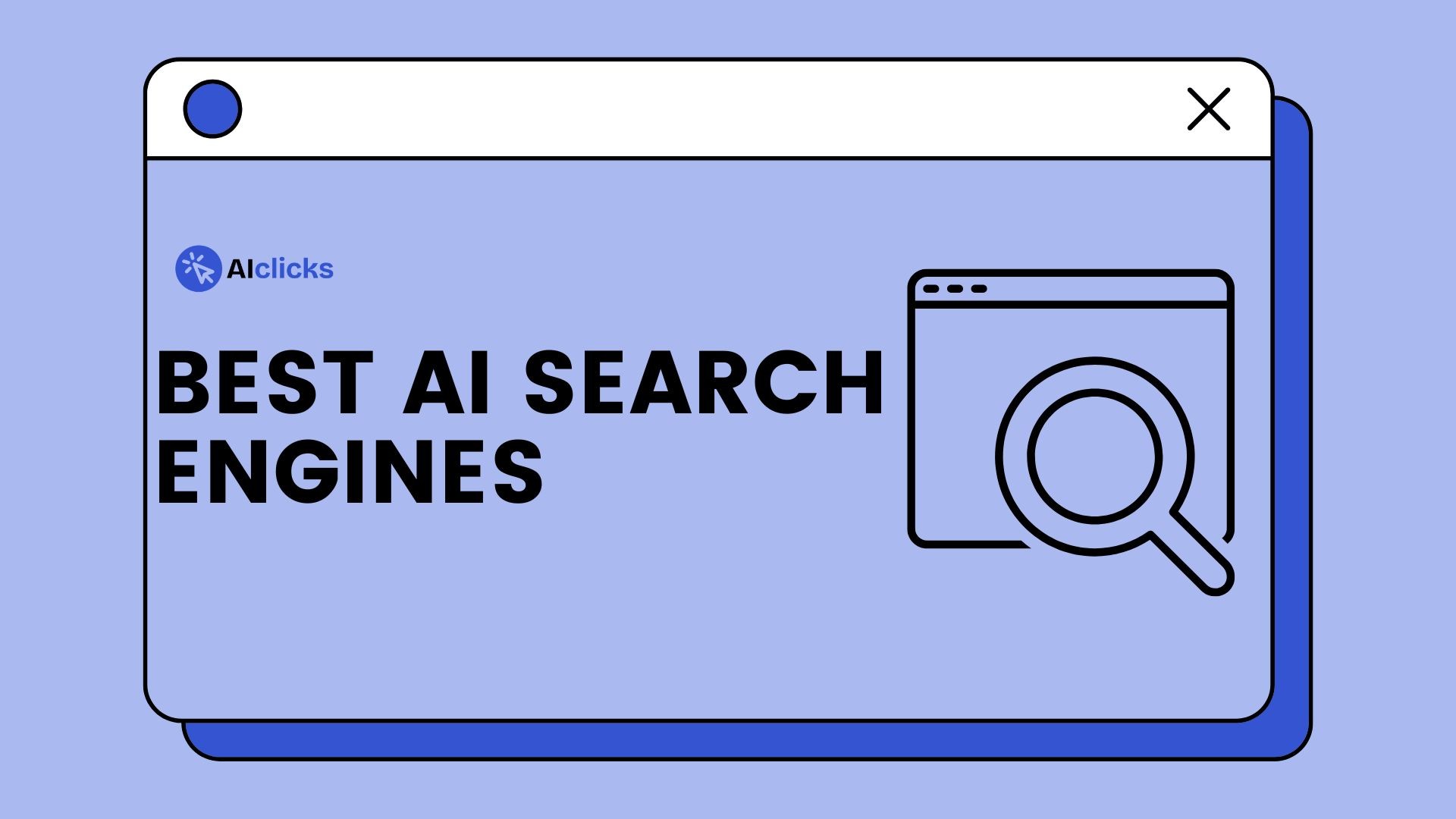Written by:
Rokas Stankevicius
Founder @ AIclicks
Reviewed by:
Matas Kibildis
Head of Growth @ AIclicks
68% of adults now use generative AI to answer their questions online. This shift has completely changed how we search for information. With AI search engines popping up everywhere in 2025, the real problem isn’t access, it’s picking the one that actually fits your needs.
In this guide, you’ll learn exactly how to size up your search needs, spot the features that really matter in 2026, and zero in on the tools that give you the best mix of speed, coverage, privacy, and user experience. We’ll break down
The most important criteria for evaluating any AI search tool
Top tools on the market and what makes each one unique
Clear, practical steps to help you pick the best option for your workflow this year
Ready to spend less time searching and more time finding? Let’s get started.
Main Steps to Choose the Right AI Search Tool in 2026
Step #1: Define Your Primary Search Needs
Before you start weighing your options, get specific about what you need from your AI search engine.
Don’t overlook your real-world workflows. A tool like DeepSeek is excellent for coding, while ChatGPT Search is hard to beat for conversational Q&A across diverse topics. Make a shortlist of your must-haves so you're not wooed by shiny but irrelevant features.

Step #2: Compare Key Features Across Leading AI Search Tools
Now, it’s time to look closer at what each option brings to the table. Stack up top tools side by side for a clear comparison:
Tool | Best For | Unique Strengths |
|---|---|---|
DeepSeek | Coding, technical research | Transparent, open-source, cheap |
ChatGPT Search | Chat-based search, fast NLP, web integration | GPT-4o, chatbot, real-time data |
Perplexity AI | Generative summaries, casual browsing | Quick, concise, user-friendly |
Google AI | Broad, general search | Largest index, free, familiar |
Andi Search | Privacy-focused users | No tracking, chat+search hybrid |
Look for what actually matters for your daily use. Some tools shine with summaries, privacy, or browser plugins, while others score points for transparency or niche capabilities.
Step #3: Evaluate User Experience and Interface
This is where rubber meets the road. Ask yourself: do you want clean lists of links, conversational replies, or maybe both? The way an AI search tool delivers results can make or break your workflow.
Check for browser and mobile integrations to keep searches quick and accessible.
Assess the learning curve—some tools are ready right out of the box, while others need a bit of setup.
A user-friendly interface isn’t a luxury—it’s key to saving time every day.
If you spend more time trying to figure out a tool than using it, it’s not the one for you.
Step #4: Analyze Pricing and Subscription Options
AI tools run the gamut from fully free to premium subscriptions. List out your top contenders and the actual cost for YOUR usage.
Tool | Pricing — starting from |
|---|---|
ChatGPT (OpenAI) | Free (€0 / month). Paid: Plus €23 / month (approx. $20). |
Claude (Anthropic) | Free ($0 / month). Paid: Pro ~ $17/mo (annual) or $20/mo billed monthly); Max plans from $100–$200/mo. |
Gemini (Google) | Free tier available. Paid consumer tier Gemini Advanced ≈ $19.99 / month (paid plans/features for advanced access). |
Perplexity | Free tier available. Paid Pro $20 / month (Perplexity Max/Enterprise tiers higher). |
DeepSeek | Free access available. API usage priced by tokens — example: 1M input tokens (cache hit) $0.028; 1M output tokens $0.42 (API pricing basis). |
Step #5: Check Privacy Policies and Transparency
Privacy is a big deal in 2026. Make sure you know how a tool handles your data. Look for:
Clear privacy statements (not legalese you can't decipher)
Data retention details and tracking limits
Source citations and uncertainty indicators for transparency
If you value privacy, tools like Andi Search and Brave Search are your best bets. These platforms explicitly block trackers and don’t log your queries.
Step #6: Test and Iterate Before Making a Final Choice
Don’t just take a tool’s marketing at face value—put your favorites through their paces with real queries relevant to your daily work. It’s the only way to see how they’ll hold up under pressure.
Run the same tasks on your top 2 or 3 options.
Compare for quality, speed, and fit with your existing setup.
Gather feedback from teammates or peers if you work in a group. Sometimes a tool that clicks for you can be a headache for someone else.
Ultimately, value comes from a tool that consistently delivers for your needs—not just one that wins on specs.
The right AI search tool should fit your unique usage, not the other way around. Anchor your search in what matters most to you, and you’ll land on a solution that really accelerates your workflow.
Best Practices for Choosing and Using an AI Search Tool in 2026
It’s easy to get distracted by marketing buzz and new features, but none of it matters unless your AI Search Tool matches your real needs. Whether you’re searching for research, coding help, or just want a privacy-friendly way to explore the web, sticking to a few essential practices keeps things simple and focused.
1. Start With Your Most Frequent Search Scenarios
Identify your everyday use cases before jumping into comparisons. Think about the AI Search Tool tasks you run all the time. Are you researching academic content, sorting through technical docs, or looking for accurate answers to broad questions? Jot down three or four typical searches and make those your baseline. This lets you filter out tools that sound impressive but wouldn’t actually help with your daily work.
2. Evaluate Tools Side-by-Side for Domain Strength and Privacy
Don’t pick blindly or base decisions on big-name marketing. Put at least two AI Search Tools next to each other, checking them for accuracy, speed, and knowledge in your domain. At the same time, look for honest privacy features. Notice which providers are clear about data collection versus those who bury details in fine print. Line up features, strengths, and privacy policies so you’re seeing the whole picture rather than just a logo.
3. Take Advantage of Free Trials and Test Quality Hands-On
A flashy demo page isn’t enough. Use free trials or free tiers to run your top queries and see how an AI search tool handles real-life questions. Evaluate usability: is the tool easy to learn? Are answers clear and well-cited, or just generic summaries? Most leading AI tools now offer some sort of free access, making it risk-free to run a direct comparison. You can find more tips on which free trials to start with in this rundown of 2026’s standout options from NoGood’s AI search tool summary.
4. Read User Reviews and Independent Comparisons
Look beyond the brand’s own website and see what actual users and third-party testers say about each AI Search Tool. Search for recent reviews or comparisons from people in your field. These real perspectives flag problems with privacy, usability, or hidden fees that glossy product pages tend to gloss over. Recent reviews are especially valuable since AI search tools update fast.
5. Prioritize Transparency and Honest Data Handling
Openness matters more than ever. Pick AI search tools that explain their results and make it clear how your data is used. If an answer has weak spots or uncertainty, it should be flagged—not hidden. Trust comes from transparency, so always put more weight on tools that are upfront about their sources and policies. Both DeepSeek and Perplexity stand out here, providing clear reasoning and source links with each answer as detailed in NoGood’s latest analysis.
6. Keep Your Setup Fresh With Regular Tool Reviews
The AI scene doesn’t sit still—new updates, models, and data privacy rules pop up every year. Revisit your chosen AI Search Tool every 6 to 12 months. Run your typical queries on a couple of newer tools or check what feature sets have changed since your last look. This doesn’t have to be a big project, but it stops you from falling behind while others get faster, smarter results.
7. Measure Workflow Improvements and Document Your ROI
When you make a switch to a new AI Search engine, keep score. Did you save time on research, boost accuracy, or streamline a recurring task? Track changes in your results or productivity for a few weeks and write down what’s improved. This helps you spot success—or issues—early, and arms you for smarter decisions next time you review or recommend a tool. Consider even a simple before-and-after benchmark of task completion time or answer quality.
By applying these steps, you make technology serve your real needs and avoid getting lost in the noise of endless options. Focus on fit, transparency, and regular review to ensure your AI tool helps you find better answers, more quickly, every day.
Key Takeaways
Choosing the right AI Search Tool in 2026 is all about matching your specific needs with the tool’s actual strengths. Write down your most common searches, compare options, and always check for privacy practices.
When you focus on fit instead of hype, you’ll save time every day and get answers you actually trust. That’s what AIclicks is all about—helping you get smarter, faster results so you can focus on what matters.
Our Content:
Guide
How to Use Perplexity AI (Like a Pro) in 2026
Feb 12, 2026
Guide
How to Get Backlinks to Your Site in 2026
Feb 12, 2026
Tools
8 Best AI Search Engines in 2026
Feb 12, 2026
Tools
9 Best LLM SEO Tools for 2026 (and how to pick the right one)
Feb 12, 2026
Tools
10 Best LLM Optimization Tools in 2026
Feb 12, 2026
Tools
9 Best tools for tracking LLM visibility in 2026
Feb 12, 2026
Any questions left?
Book a call here:











